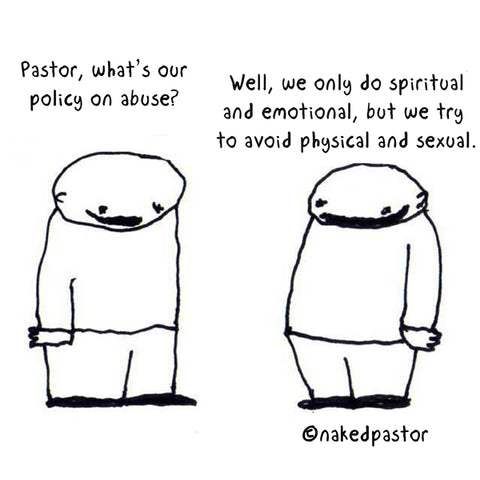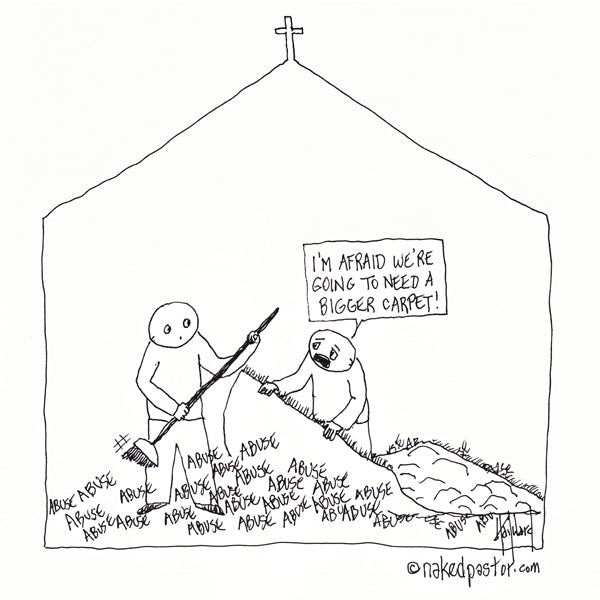I receive many complaints when I talk about spiritual abuse in the church.
They say my criticism is unfair because spiritual abuse is so rare. But they’re wrong. I continue addressing it because I believe millions of people experience spiritual abuse at the hands of their churches and its leadership.
It’s real and prevalent and happening right now.
Plus, the number of grateful messages I receive far outweighs the number of naysaying ones, so I’ll continue talking about it in order to help those who want to escape abuse and heal from it.

I believe this was my very first spiritual abuse cartoon, from all the way back in 2008. It's titled, Church's Policy on Abuse, and it's available as a digital download.
Before I proceed, I want you to know that I address this with three credentials:
- I inflicted spiritual abuse as a pastor;
- I received spiritual abuse as a church member;
- I care for many victims and survivors of spiritual abuse.
There’s also a premise I believe I should warn you about:
I claim that all institutions are breeding grounds for abuse. Their gravitational pull is toward the inhumane treatment of its members. By institutions I mean everything from the smallest, like a marriage, to some of the largest, like the church.
Because it is such hard and relentless work to prevent this gravitational pull from occurring within these institutions, it’s much easier to just ignore it, to just let it continue, or to just use it to achieve the results the abusers want from it.
Often, the leadership of churches, and sometimes even the congregations themselves, desire the results that spiritual abuse can achieve… things like obedience, complicity, control, and order. The lack of chaos is most highly desired, and abuse is one way to achieve it. Leaders know this.
I believe the church is an institution that can experience the gravitational pull towards the dehumanization of its members. The church is a perfect culture for spiritual abuse to occur.
So, here’s a list explaining why this is so:
- The church silences abuse in order to protect their ministries.
I’m often accused of slandering the church and casting a shadow on its ministry. Actually, the abuse is what slanders and casts a shadow on the church, not its exposure. Many believe that sacrifices must be made to perpetuate the gospel. No pain no gain! If we must suffer to spread the gospel and grow the church, then so be it. If the end is a glorious church and the means is a person hurt here or there, then it was worth it. So it’s best to not talk about it. - Parents entrust themselves and their children to leaders without question.
I live in Canada where churches are required to have at least two adults present with children in order to lower the risk of abuse. Churches also have insurance policies to handle abuse allegations. Nevertheless, too many parents, even of teenagers in their church’s youth group, trust the leadership unquestionably. The number of stories of abuse and even assault that occur in Sunday Schools and youth groups are astounding. Parents should assume responsibility for their children at all times and not blindly trust spiritual leaders with the safety of their children. - The church nurtures a victim culture.
It works in two ways. First, it starts with verses like “turn the other cheek” and “do good to them that hate you” that the church uses to instill and nurture a victim mentality in its membership… that they should take abuse without complaint. Second, if anyone does complain about abuse, the accused and usually the entire congregation will claim that you aren’t on board, you’re not with the program, or you’re resisting the Spirit. Women are accused of having a Jezebel spirit and men are accused of being weak and divisive. This effectively silences any allegation of abuse. - Christians trust their leaders, even to their own peril.
I don’t know how many times I’ve heard the threat, “Touch not God’s anointed!” It’s from when King David executed a man for claiming to smite Saul, even though Saul was in the wrong. This makes a person in ministry essentially untouchable. Yes, even if they’re doing wrong! If God called them to do what they’re doing, who are we to question it? So many stories from the Bible are about flawed human characters whom God nevertheless uses for his purposes, lifting them above criticism. Today’s spiritual leaders often claim this same immunity. - Church leaders enjoy an incredible lack of accountability
Some people claim that abuse happens in more loosely organized churches because their leaders aren’t accountable to a higher authority. But if you take a quick look at the level of sexual abuse in the Roman Catholic Church, which is highly organized with many layers of authority and accountability, you will realize the emptiness of this argument. Again, I assert that abuse happens in all institutions. The lack of accountability I’m talking about here is that many people naïvely trust leaders to not do bad things, so they assume they don’t. Plus, keeping someone accountable for something that’s done in secret is almost impossible. Most of the spiritual leaders (and other kinds) I’ve known and have heard of are unwilling to submit themselves to any kind of close scrutiny. Especially from the people they lead. - The church ghettoizes itself and presumes immunity from its critics.
You’ve heard the saying, “What happens in Vegas stays in Vegas!” The same applies to the church: What happens in the church stays in the church! Most congregations consider themselves as a kind of family. It would go against the unspoken family code to speak about anything negative going on on the inside to those outside. “It’s private. This is none of your business. We’ll handle it.” I know this firsthand. When I was a pastor, people were disappointed and even shocked that I would criticize the church. They accused me of biting the hand that fed me. “If you don’t like it, leave!” Then, when I did leave and continue my critique of the church, people were disappointed and shocked that I would dare criticize something I wasn’t a part of or invested in because they believed I’d lost my right to say anything by no longer being a member. This is the prevailing attitude about any criticism, from within or without. - The church prefers forgive and forget over restitution and reparation
Like all institutions, one of the church’s primary concerns is survival. Many churches think the fastest way to restore order is to forgive the perpetrator and forget the incident and move on. Especially when it comes to leadership because we all know how disruptive this would be. Congregations generally consider constantly dealing with complaints of abuse as a nuisance rather than as an important way to work towards an authentic and healthy community. It’s faster to ignore it and move on than to deal with the intense and often lengthy process of repentance, reparation, and restoration. - Criticizing and judging is explicitly unchristian and implicitly forbidden
We’ve all been told that we should not judge others. Have you ever criticized someone in authority and the response you get is something like, “Who are you to talk? You’re not perfect either!”? Originally given as an inspiration to be humbly self-aware, it’s now used by perpetrators to insulate themselves against being called out on their abuse. When we think of judging others, we should understand that this means we ought not condemn others to a life-sentence. This does not mean we should not use discernment to detect abuse when it occurs. Even when someone is doing some good work, if they are harming others in the process, this should be called out and dealt with. - Appealing to the secular courts is categorically unbiblical
Paul chastises the Corinthian church for taking each other to secular court. He insists that such things should be taken care of in-house. This one verse is used over and over again to prevent victims of abuse and assault from valid legal recourse. Churches prefer to keep it in the family rather than airing their dirty laundry for the whole world to see. They are concerned about damaging their reputation and the church’s testimony. In fact, even though there are laws stating that cases of sexual assault against a minor be reported, many churches presume they are above this rule and can and should handle it themselves. - Many Christians can’t believe their leaders would harm them.
As a pastor I was often surprised by the unquestionable loyalty and even adoration I would receive from some people. I felt it was uncalled for and unearned. The presumption people made was that if I was a pastor, I must be a wonderful person and could be totally trusted. I am a nice guy, and this only fed into their presumption. But, when I thought about it, I too served under certain spiritual leaders who impressed me. I too got caught up in the presumptions of their greatness that their charisma only helped to fuel. When they did eventually hurt me, at first I denied it was happening… until I could deny it no longer. I simply couldn’t believe they would do that to me. To this day it still baffles me. This is, sadly, the experience of most victims of abuse.
Many church leaders are unaware of the concept of systemic evil within systems like the church. Many disagree with the idea of systemic evil because how could “the Bride of Christ” be guilty of this? But this willful blindness only allows it to continue unabated. I insist that it is important to recognize this tendency in institutions toward the dehumanizing of its members and that we need to work hard constantly to prevent this from happening.
But, here’s a strange thing about spiritual abuse. I tell stories of the spiritual abuse I received. I now recognize my complicity in it. No, I’m not blaming myself for the abuse. But I do see that I was in such a place that I allowed it to happen to me while I didn’t recognize it, denied it, or wouldn’t believe it. Maybe I thought I was being spiritual disciplined, or maybe I was being obedient and submissive to authority, or being loyal, or maybe I was being mentored, or just being persuaded, or just experiencing tough love. Now I realize it was abuse. Plain and simple.
This is why I claim the church is a perfect culture for abuse. It potentially provides a protected place for predators, abusers, and bullies to hurt others, and it potentially provides a dangerous place where vulnerable people can get hurt.
If you are you experiencing this, you can escape, you can be free, and you can be healed.




3 comments
Your comments have been so very helpful. Thank you so much! I’d like your opinion on an issue that is currently occurring at our church. We are in the process of providing questions,etc regarding a “revised church constitution”. The new pastor made it excessively long and its shocking to read. This is because our new pastor who wrote this 45 page document himself, with help from other associates and friends (that he says he has used plus his own desires) has actually resulted in a consolidation of all power into the hands of the pastor himself(along with numerous biblical verses -to support his assertions for controlling us and continually repeating that he has “God ordained authority” in this constitution. How can a man who gives good sermons and is a pastor of our church be so power hungry that he has actually written into our constitution that he has the "sole authority at his own discretion to abolish any ministry "as “he desires”? I am totally astounded at this shocking and flagrant abuse of power. We have not gotten to this portion yet,but this ONLY one of the controversial issues that will be debated. Also, before our constitution has even been totally discussed, he has taken away the choir, (filling up the time with extra prayer meetings), taken away our song leader and announcers job on Sunday mornings(that he now does by himself)-and he cant even sing!,, and told me that I can no longer sing any solos. There is now NO special music or choir. How bad is this going to get after our constitution is officially approved? This Sunday (11/24/2024) we will again discuss issues relating to these items. If you could, is it possible to respond to these concerns asap? thanks so much and Happy Thanksgiving to you. Mary
I so agree with this article and with the other woman’s comment (Teri). It absolutely astounds me the mindless sheep mentality of people regarding religious leaders. Once you have been damaged and have the strength to walk away, you blatantly see the ridiculousness of most religions and churches, the motivations behind their teachings, and the obvious gullibility of their members. But the sad thing is is that like Teri went to the church looking for spiritual support for her and husband in a time distress, she didn’t find God’s love and understanding, she found condemnation and ego centric small mindedness. How many of us have suffered that way at our lowest points in life? I see the fallacies in religions now, so much man-made rules, I can never go back to that. Strip all the rules away and search for God on your own. He’s there, always has been. He doesn’t require all the layers that religions put on Him for you to have a relationship. In the beginning there was just God, before MANkind. Just pure, loving God.
You are ABSOLUTELY CORRECT!! If you want to share my experience, you can read my google review for “Fountain of Life Church” located in Cordova, Maryland. In one service, the Pastor decided to go out on a limb: (we were new attendees, having only been there about 2 months). Pastor spoke out saying, “I am about to offend some people.” Then he said that “women should NEVER tell a man what to do.” The blood of Jesus does not flow to people who are not in a congregation, especially if they have an, " independent spirit". Women are gossipers! Pastors are NEVER WRONG! I nearly fell off my pew. If you read the google review that I left, you will understand just how amazed that I was. His members had unquestionable loyalty, whatever he said was automatically right, no matter what he said! Once I posted the google review, then all his members began contradicting my review, not surprising. They did not have " Pastor’s appreciation Day", they had Pastor Appreciation week or was it month. I could not believe how closed minded these people had become, indoctrinated. I am sure that they considered me to be the " devil", since I spoke openly against him in my review. I did include his good characteristics however in the review. It is my opinion that these kind of lessons promote abuse against women, "just sit there and shut up woman, like the Pastor told you to do! I just cannot understand why anyone would blindly accept this " private interpretation" of Scripture, since the Bible clearly tells us that there is " no private interpretation of Scripture." Last time I checked, the only ONE who is NEVER WRONG IS GOD, and anyone making themselves equal to God fell out of the heavens with a crash of lightning! I found this to be very scary, and of course we both left, my husband and I. The very sad thing is this, we went to this church so that the Pastor would pray for my husband who had recently been diagnosed with cancer. We sat there 2 months, just waiting to see if he would ask if anyone had a need and wanted prayer, instead, the Pastor misread my strong personality, and made it about criticizing women in general, and I am thinking it was mainly against me. My husband hqs eyesight problems, so I drive. Apparently, that was not ok, either. The Lord bless them, it seems like they have worse sight than he does!